FREE Training: How to Launch Your Property Management Company
Starting your own property management company in New York requires careful planning, knowledge of local regulations, and a strategic approach.
From navigating legal complexities to establishing a solid local client base, there is a lot of work before you get to the rewards that property management can bring.
However, if you make the right decisions for your property management business, we promise that it is possible to start your own company in New York and thrive in the long run!
In this blog post, we will go over everything that you need to know in order to start your own property management company in the state of New York.
From finding property management clients to learning about New York rental property regulations, we will go over our top recommendations to help you side step the most common pitfalls that many new property managers face when they start their own property management business.
So, if you’re ready to learn all about how to start your own New York property management company, then keep reading!
What Exactly Does It Take to Be a Property Manager in New York?
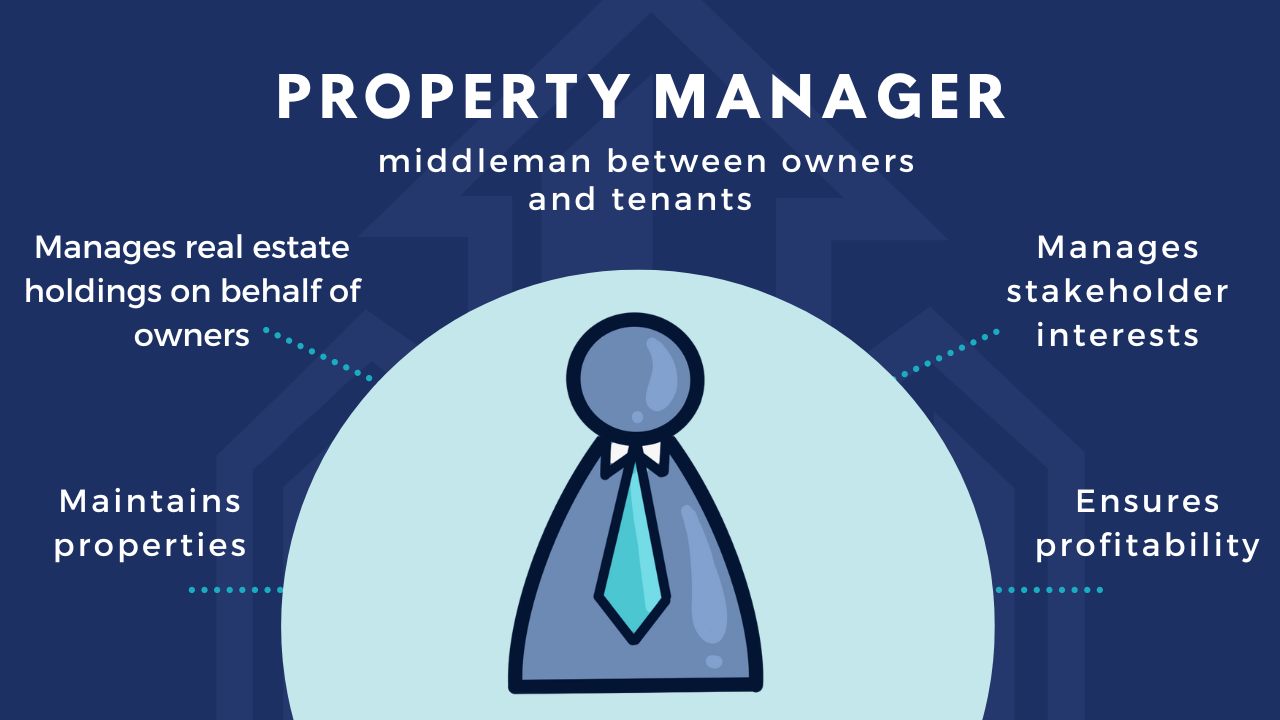
Property managers primarily serve as essential intermediaries in real estate. This means that they are most often working to bridge the gap between property owners and tenants in order to facilitate smooth operations and make sure that everyone involved has their needs met.
A property manager’s responsibilities encompass a wide array of tasks that are tailored to meet the needs of diverse rental properties, from multifamily apartment complexes to single-family homes.
What Are Some of the Key Duties of a Property Manager in New York?
Central to their role is overseeing the day-to-day functions of managed rental properties. This entails an assortment of organizational duties, from leasing arrangements to maintenance and upkeep.
Maintaining communication between both owners and tenants is crucial, ensuring that everyone remains well-informed and needs are promptly addressed.
Some primary responsibilities of a property manager include the following:
Tenant management: Managing all aspects of tenant interaction, from lease negotiations to addressing inquiries and overseeing maintenance requests.
Maintenance and repairs: Ensuring properties are kept in optimal condition, including scheduling regular inspections and coordinating necessary repairs with trusted vendors.
Financial management: Setting competitive rental rates based on market analysis, overseeing rent collection, and monitoring the financial performance of the property portfolio.
FREE Training: How to Launch Your Property Management Company
So, think you got what it takes? If so, let’s dive into our 9 steps to help you start your own property management company in the state of New York.
9 Steps For Starting Your Property Management Company in New York
Step 1: Figure Out How You Would Like to Structure Your Property Management Business
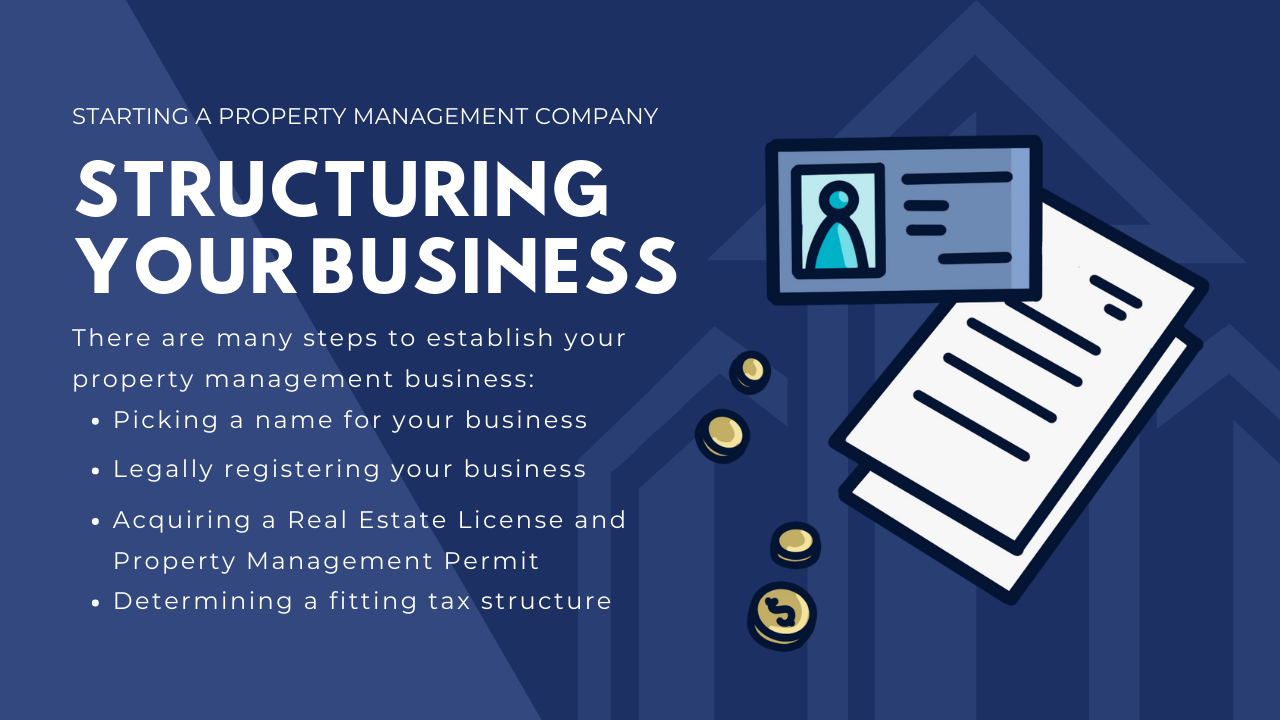
Establishing yourself as a credible property management company begins with choosing a name and legally registering your business.
Setting up a legal entity in New York, or any state for that matter, involves navigating complex requirements. Consulting with a corporate accountant in your area is highly recommended to ensure compliance.
Your local Chamber of Commerce can also provide valuable guidance on the registration process.
Next, you’ll want to create your business plan. Developing a comprehensive business plan is crucial as it guides decisions on business structure and mitigates personal and professional liabilities.
Once you are officially registered and structured for taxes, you will want to start initiating legal processes to safeguards your assets, business, and personal liability going forward.
FREE Training: How to Launch Your Property Management Company
Step 2: Make Sure You Have All of Your Certifications
Operating legally as a property manager in New York involves navigating a specific set of licensing requirements designed to ensure compliance with state laws and validate a manager’s competence in the field.
Essential to this process is obtaining a New York real estate broker license, which mandates several prerequisites.
Detailed guidance on these steps and additional requirements can be found in resources such as Property Management Laws in New York.
In addition to gaining the proper licenses for property management, it can also significantly help your career to earn some additional certifications.
These certifications serve as tangible evidence of expertise in property management and are widely respected by clients as indicators of professionalism and a commitment to continual growth.
Here are some of the certifications that you can earn in property management:
Certified Apartment Manager (CAM): The Certified Apartment Manager (CAM) certification, administered by the National Apartment Association, is tailored for managers of apartment complexes. It focuses on essential skills such as financial management, legal compliance, and effective communication.
Certified Property Manager (CPM): Offered by the Institute of Real Estate Management (IREM), the Certified Property Manager (CPM) designation is highly regarded within the industry. It signifies that a property manager has attained a significant level of experience and education.
National Apartment Leasing Professional (NALP): The National Apartment Leasing Professional certification targets leasing consultants and emphasizes foundational skills necessary for effective leasing and occupancy management in apartment communities. The curriculum covers topics such as leasing techniques, fair housing practices, and strategic marketing.
Master Property Manager (MPM): For property managers aspiring to the highest level of recognition in the field, the Master Property Manager (MPM) certification, offered by the National Association of Residential Property Managers, represents top achievement.
These certifications not only show that you have specialized knowledge in property management, but they can also enhance your long term career prospects and credibility in the competitive New York property management industry.
Each certification can offer you a unique set of benefits that are tailored to different roles within the field of property management, ensuring that you can continually develop your skills and expertise to meet the ever evolving industry demands.
FREE Training: How to Launch Your Property Management Company
Step 3: Read up on All the Relevant New York State Laws
The truth is, being a property manager in New York demands a thorough understanding of its intricate web of real estate laws and safety protocols.
This is essential for protecting your clients and properties. Mastering legal compliance and effective risk management strategies is crucial.
New York’s strict regulations outline the precise criteria for rental property agreements, requiring property managers to possess a comprehensive knowledge of state-mandated leases and contracts.
Having this knowledge ensures that all of your documentation is legally sound, detailing tenant rights, obligations, and retention policies clearly.
Moreover, overseeing the eviction process entails meticulous adherence to New York law to minimize legal liabilities effectively.
Bottom line, if you want to succeed as a property manager in New York, you may want to do your research before you dive in.
Step 4: Create a Strong Legal Contract
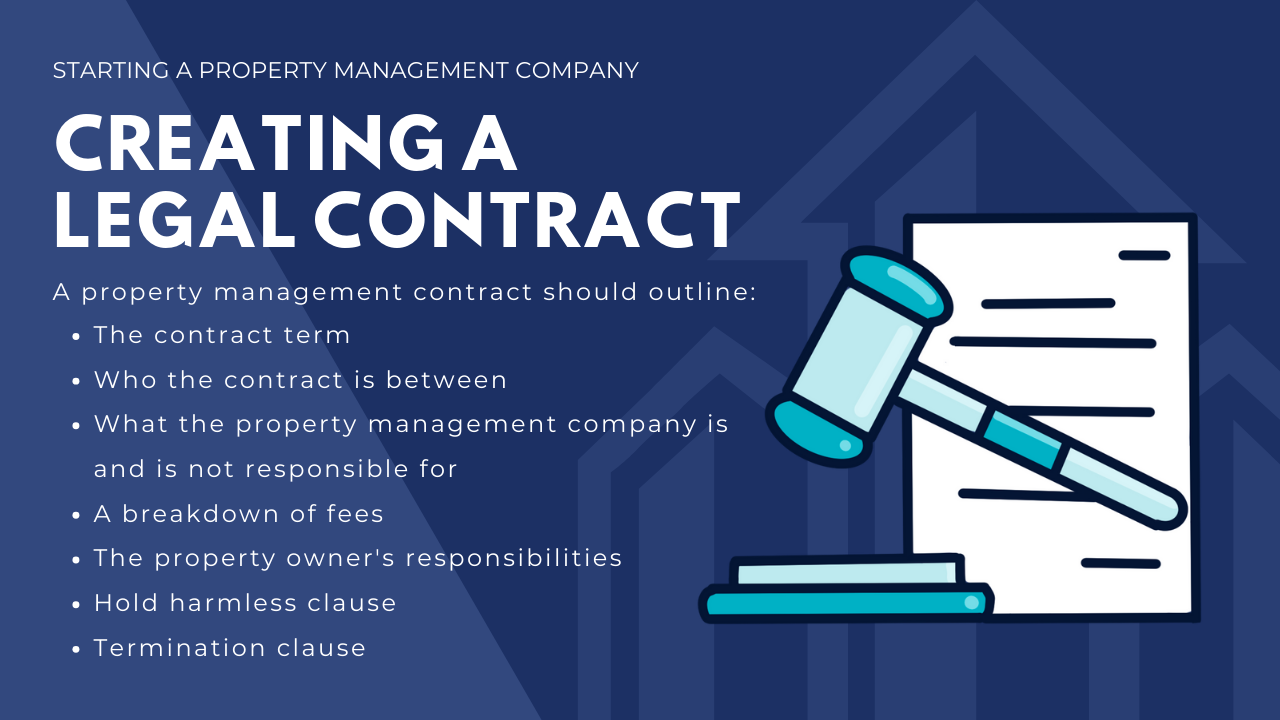
Once you have legally registered your company, established its structure, and ensured that you are qualified for the role of property management, the next crucial step is drafting a strong, legally-binding contract for your New York clientele.
Starting this process early is advisable, as it can be time-consuming and potentially costly, especially in terms of legal fees.
Furthermore, collaborating with a specialized attorney in property management ensures that both you and your company are shielded from liability, fraud, and the various risks associated with potentially challenging future clients.
A comprehensive property management contract must strictly adhere to New York laws. Your contract should clearly define:
- The duration of the contract.
- The parties involved (your company and the property owner).
- The scope of responsibilities of the property management company, encompassing property maintenance, tenant acquisition, rent collection, repairs, emergency maintenance, and ongoing monthly obligations.
- Exclusions from the property management company’s responsibilities.
- Detailed breakdown of fees owed by the property owner to the management company.
- Obligations and responsibilities of the property owner.
- A “hold harmless” clause, which legally absolves one or both parties of liabilities in case of injuries or damages.
- A termination clause specifying conditions under which either party (your company and the property owner) can terminate the contract with or without penalties.
Making sure that these elements are clearly outlined and legally sound in your contract not only protects your interests but also creates transparency and trust with your clients in New York’s competitive property management industry.
At the end of the day, creating trust with your clients is the best way to keep them for the long term.
FREE Training: How to Launch Your Property Management Company
Step 5: Create a Business Plan for Your New York Property Management Company
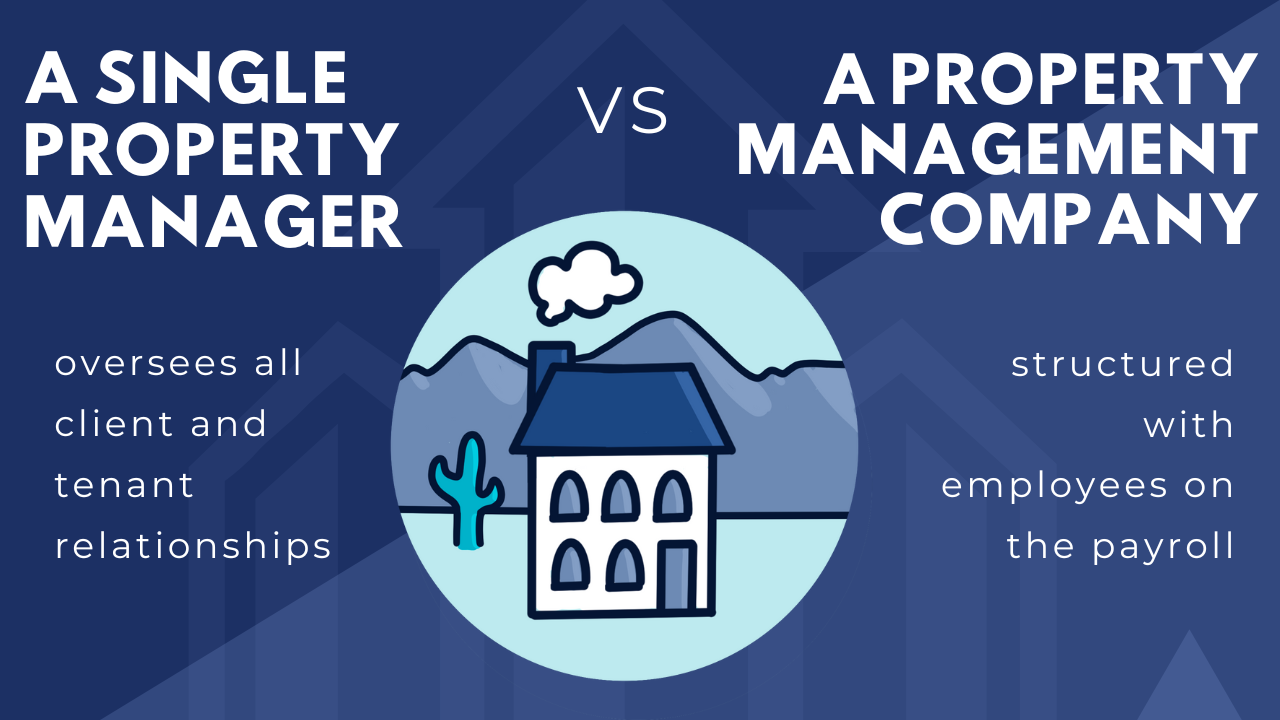
As you continue to progress in establishing your business, it is essential to consider both your short-term objectives and your long-term goals while coming up with a scalable plan for your property management company.
Typically, property management companies operate under two primary structures:
One model involves a single property manager overseeing all client and tenant relationships, outsourcing tasks to other businesses or contractors as needed.
Alternatively, some companies opt for a structured approach with employees on payroll, ensuring workload distribution and specialization within the team.
While these are the most common structures, it’s important to remain flexible. Many property managers initially start as sole proprietors using contractors to manage their workload.
Then, as their client base expands, they often transition to employing a team with a defined business hierarchy to manage operations more effectively.
Expanding your business involves filling various roles, including full-time, part-time, and contract-based positions. Delegating tasks allows you to enhance client service while focusing on strategic priorities.
Here are some of the key roles to consider including once you get to this stage in your property management company:
- Additional property managers overseeing multiple properties to ensure top-notch service delivery.
- Administrative support for office operations and daily tasks.
- Sales representatives to cultivate client relationships and attract new business.
- HR professionals to manage payroll and benefits for employees.
- Finance specialists handling accounts payable and receivable.
- Leasing agents, showing coordinators, and tenant managers for tenant relations and acquisition.
- Maintenance managers and staff for routine and emergency repairs.
- Service coordinators to streamline operations.
- Marketing specialists for online presence and promotional efforts.
Additionally, after you have hired your team members, you may find yourself in need of some key contracted workers. Critical contract-based roles include:
- A proficient accountant familiar with property management needs.
- A reliable real estate attorney or law firm retained for legal advice.
- Contractors for specialized maintenance tasks like locksmiths or HVAC specialists.
- IT professionals to maintain business systems and processes.
Step 6: Find a Software to Help Your Operations Run Smoothly
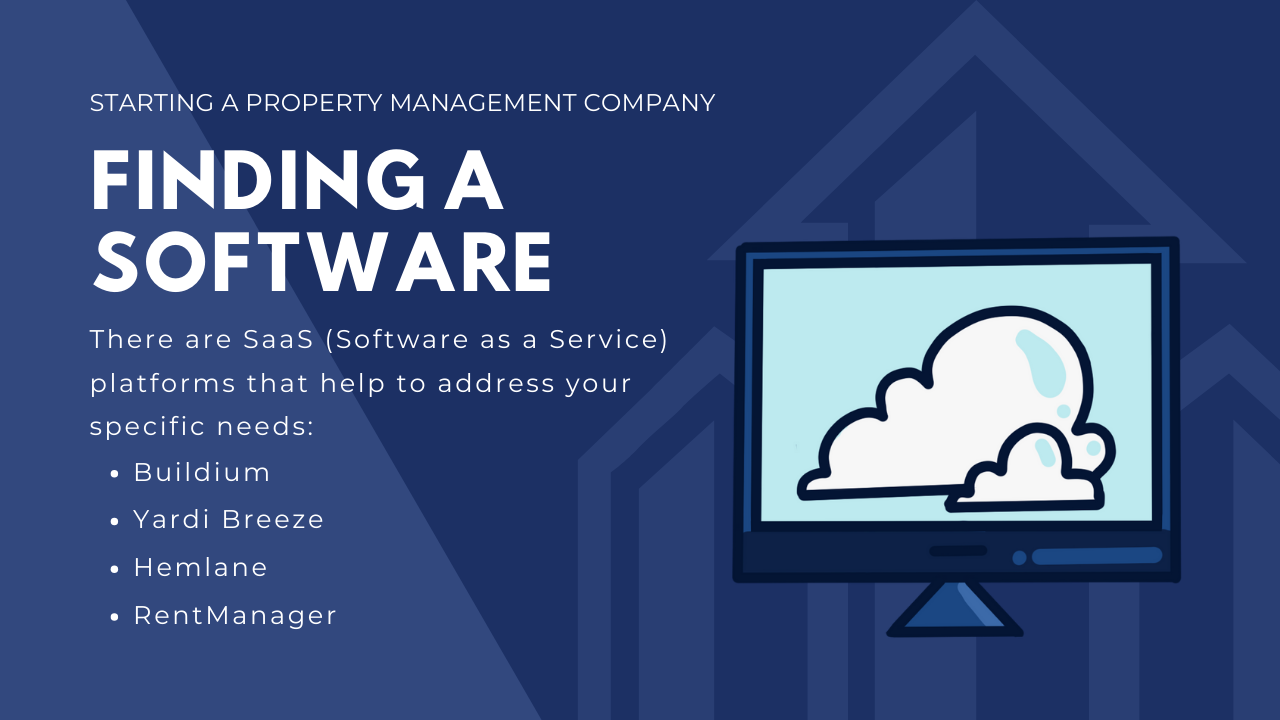
When you are a property manager, you know that your day to day tasks can feel overwhelming.
That’s why incorporating software into your operations early on can help you keep track of your responsibilities and keep things from falling through the cracks.
Finding the right software for your property management company is crucial for streamlining operations and maximizing efficiency.
Start by identifying what exactly you need help with, whether it’s managing leases, handling maintenance requests, tracking finances, or communicating with tenants.
Research and compare software solutions tailored to property management, such as Buildium. Consider factors like scalability, user-friendliness, integration capabilities with existing systems, and customer support.
Look for platforms that offer important features such as automated rent collection, tenant portals, maintenance tracking, and detailed reporting functionalities.
Additionally, you will want to seek feedback from other property managers, and read reviews to gauge user satisfaction and reliability.
Finally, opt for a software provider that offers a trial period or demo to make sure that it aligns with your business requirements before making a commitment.
FREE Training: How to Launch Your Property Management Company
Step 7: Determine Your Fee Structure
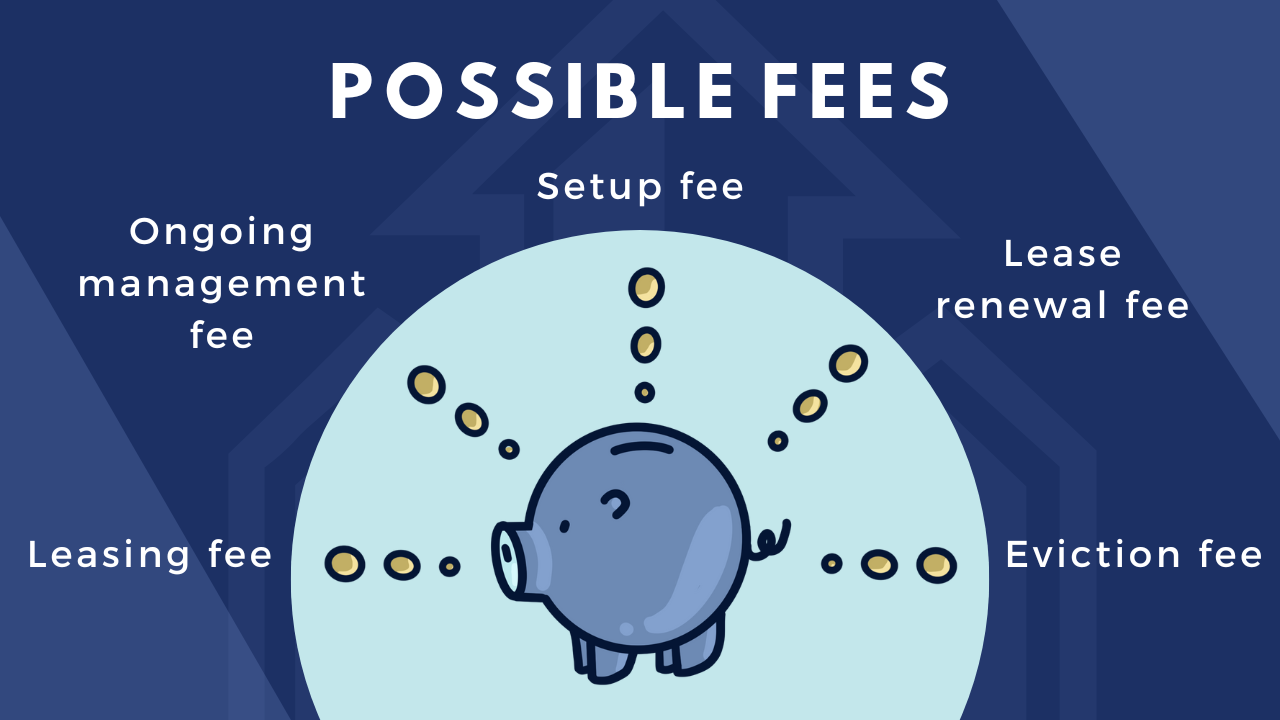
Now that you have set up your business, you’ll want to determine your fee structure.
Creating a well-defined fee structure is essential for your property management company to ensure transparency, profitability, and satisfaction among your clients.
Deciding how much to charge for your services is a delicate balancing act. If you charge too little, you won’t be able to keep your business afloat in the long run. If you charge too much, you will lose clients to your more affordable competition.
As such, it’s important to get this aspect of your business right from the beginning.
Begin by assessing your operational costs, such as your office space, software and your marketing budget. This will help you know how much you will need to charge just to keep the lights on.
Then, determine whether you’ll charge a percentage of the monthly rent or a flat fee per property managed.
Consider additional fees for leasing, tenant placement, maintenance coordination, and late payments.
You can tailor your fee structure to reflect the services offered and market rates in your area, and try to remain competitive while still making a profit.
Over time, you can periodically review and adjust your fee structure as needed to adapt to market changes and company growth.
FREE Training: How to Launch Your Property Management Company
Step 8: Market Your New York Property Management Company

Marketing your new property management business is an ongoing effort that extends far beyond simply attracting and retaining clients.
In order to ensure long-term growth for your business, investing in a good marketing strategy from the outset is essential.
Your primary focus when you are marketing your New York property management company should include:
Building a Compelling Website: A well-designed website acts as your digital storefront, making a strong first impression and attracting potential clients.
Creating Effective Marketing Collateral: Comprehensive marketing collateral supports your brand identity and promotes your services. This includes social media content, advertisements, business cards, brochures, digital guides, and blog posts.
Networking Opportunities: Actively participate in industry events and consider joining organizations like the National Association of Residential Property Managers for networking opportunities, industry insights, and professional development resources. Building a strong marketing foundation ensures your property management business can thrive in a competitive market environment.
Step 9: Provide High Quality Property Management Services
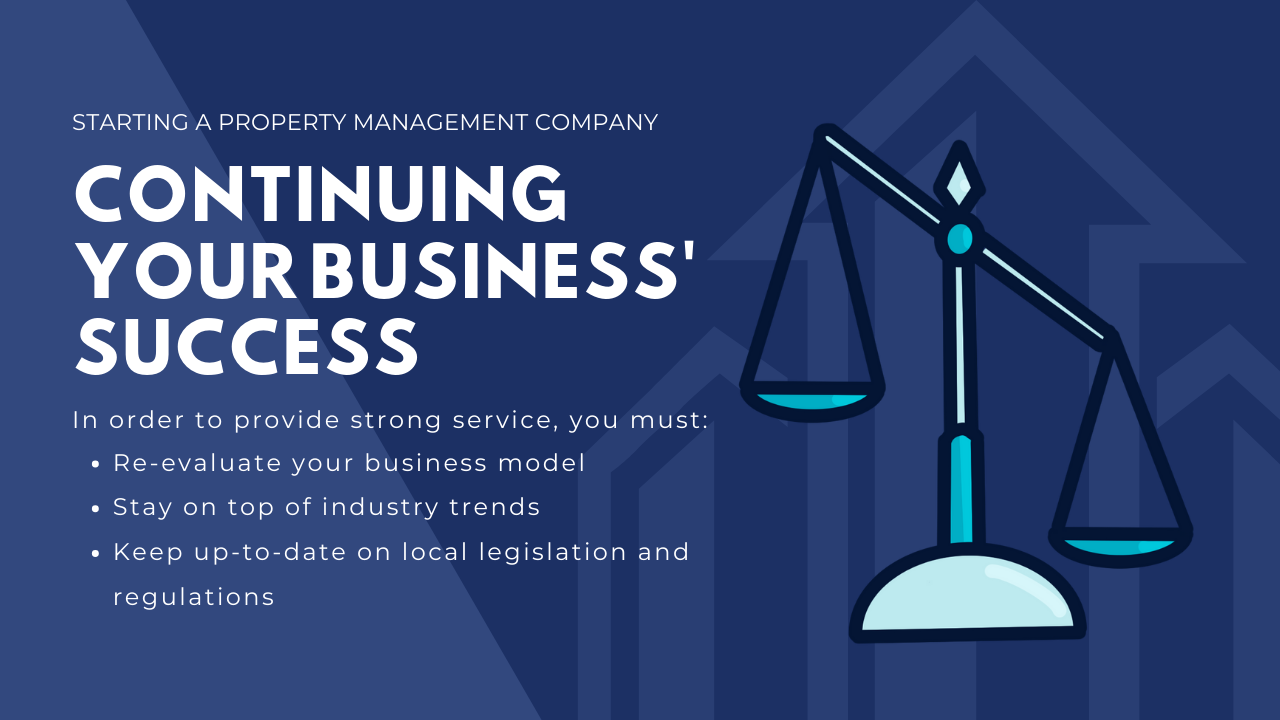
At the end of the day, nothing is as important to the health of your business as the quality of your services.
Continuing to deliver high-quality property management services to your clients requires a commitment to ongoing improvement and proactive communication.
Implement strong maintenance protocols to ensure that your properties are well-maintained and tenants are satisfied.
Use technology to streamline processes and services, such as online portals for rent payments and maintenance requests, making sure that nothing slips through the cracks.
Maintain open lines of communication with clients and tenants, promptly addressing concerns and providing transparent reporting on property performance and financials.
Invest in professional development for your team to keep them updated on regulations and best practices.
By prioritizing client satisfaction, operational efficiency, and continuous improvement, you can establish long-term relationships built on trust, generate more leads, and continue to thrive in property management.
So, there you have it!
Starting your own property management company in New York can be daunting, but if you make the right decisions early on, you will be able to avoid many hurdles in the long run.
Staying informed about industry trends, continuously improving your services, and fostering strong relationships within the real estate community are key to sustaining and expanding your business. With determination and strategic planning, your property management company can thrive.
If you have any further questions about how to start your property management company in New York, contact our team at Upkeep Media.
